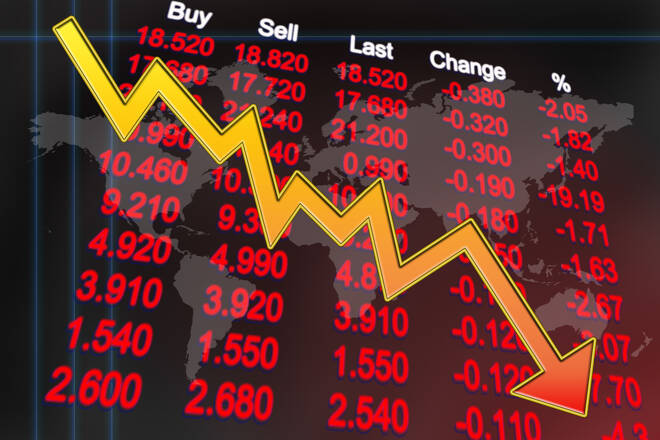Advertisement
Advertisement
US Stock Futures: Down Sharply as Investors Climb the ‘Wall of Worry’
By:
Investors are no doubt reacting to the continuing weakness in Hong Kong and shares of China's Evergrande Group.
The major U.S. stock index futures are trading sharply lower early Monday following last week’s dismal performance. The sell-off looks like investor liquidation with a slew of reasons likely fueling the move. Investors are definitely climbing the wall of worry ahead of the two-day Fed meeting on Tuesday and Wednesday.
However, there are other factors weighing on the trade including China, supply chain issues, debt ceiling negotiations and the infrastructure/tax bill to name a few. Investors are no doubt reacting to the continuing weakness in Hong Kong and shares of China’s Evergrande Group.
At 03:31 GMT, the benchmark S&P 500 Index futures are trading 4387.00, down 34.75 or -0.79%. The blue chip Dow Jones Industrial Average futures are at 34125.00, 337.00 or -0.98% and the technology-based NASDAQ Composite Index futures are trading 15233.25, down 92.75 or -0.61%.
Hong Kong’s Hang Seng Index drops 2% as Evergrande Shares Plunge More than 10%
Hong Kong’s Hang Seng Index led losses among Asia-Pacific markets in Monday’s trade, with shares of embattled Chinese developer China Evergrande Group continuing to drop. The Hang Seng Index dropped 2.18% in the Monday morning trade, as shares of China Evergrande Group plummeted more than 10% Reuters reported.
Last Week’s Weakness on Wall Street Continuing in Early Trade
The U.S. stock market ended the week sharply lower in a broad sell-off on Friday, ending a week buffeted by strong economic data, corporate tax hike worries, the Delta COVID variant, and possible shifts in the U.S. Federal Reserve’s timeline for tapering asset purchases.
All three major U.S. stock indexes lost ground, with the NASDAQ Composite Index’s weighed down as rising U.S Treasury yields pressured market-leading growth stocks. They also posted weekly losses, with the S&P Index suffering its biggest two-week drop since February.
One worry for investors is a potential hike in corporate taxes which could eat into corporate profits. The Democratic House of Representatives is seeking to raise the top tax rate on corporations to 25.5% from the current 21%.
Meanwhile, consumer sentiment steadied in early September, but it remains depressed, according to a University report, as Americans postpone purchases while inflation remains high.
Investors are also closely monitoring inflation, which is likely to be a hot topic of discussion when the Fed meets on September 21-22. Investors will be watching the Fed’s monetary policy statement for changes in language that could signal a shift in the Fed’s tapering timeline.
For a look at all of today’s economic events, check out our economic calendar.
About the Author
James Hyerczykauthor
James Hyerczyk is a U.S. based seasoned technical analyst and educator with over 40 years of experience in market analysis and trading, specializing in chart patterns and price movement. He is the author of two books on technical analysis and has a background in both futures and stock markets.
Advertisement
